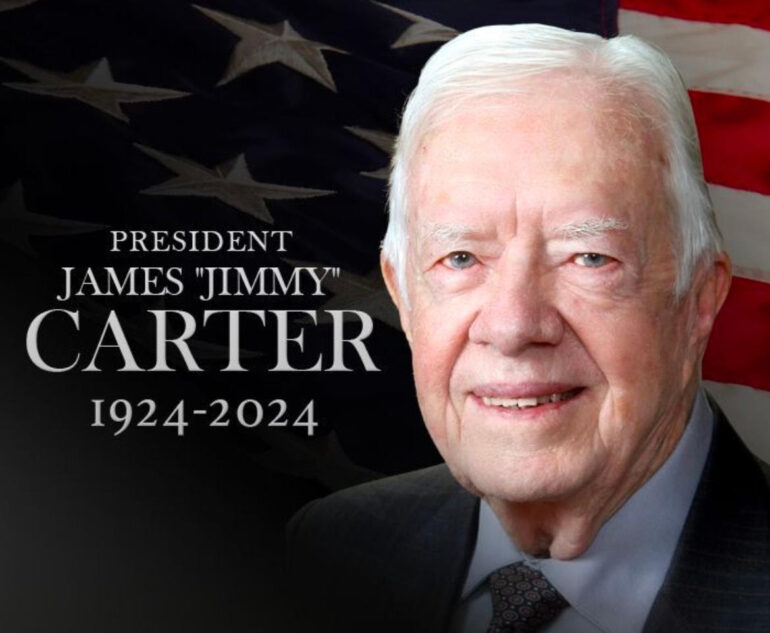The world mourns the passing of one of the most distinguished figures in American politics and global humanitarian efforts, President Jimmy Carter. At the age of 100, he was the longest-ever living President. Carter’s death marks the end of an era for a man whose life was defined not by political ambition, but by a deep, unwavering commitment to public service and human dignity.
Born in Plains, Georgia, in 1924, James “Jimmy” Earl Carter Jr., was a man who rose from humble beginnings to become the 39th President of the United States. His journey through public service—marked by his time as a U.S. Navy officer, governor of Georgia, and ultimately, President—was always guided by his faith, his moral compass, and his belief in the power of compassion and justice.
A Presidency of Peace and Idealism

Carter’s presidency, which lasted from 1977 to 1981, was marked by idealism and a focus on human rights. Carter came into office during a time of considerable national and international turmoil: the United States was reeling from the Vietnam War and the Watergate scandal, and the Cold War with the Soviet Union was at its peak. Yet, Carter took office with a clear and ambitious vision—to use diplomacy, human rights, and moral leadership to forge a more peaceful world.
One of his most enduring legacies was the Camp David Accords in 1978, which brought together Egyptian President Anwar Sadat and Israeli Prime Minister Menachem Begin to negotiate a peace treaty that had long eluded the Middle East. The agreement not only led to Egypt becoming the first Arab country to recognize Israel but also helped establish Carter’s reputation as a president dedicated to peace.
Carter’s administration was also marked by a push for energy reform, environmental protection, and a focus on social justice. He placed a high priority on tackling issues like inflation and unemployment, though his presidency was also marked by significant economic challenges, including the energy crisis and the Iran hostage situation, which overshadowed much of his term.
Despite these challenges, Carter never wavered in his commitment to a vision of government that was both ethical and empathetic. Even after leaving office, he maintained a steadfast belief in the importance of moral leadership and service to others.
Life After the White House: A Champion of Humanitarian Work

Following his presidency, Carter’s influence only continued to grow. While many former presidents retreat into the private sphere after leaving office, Carter’s post-presidential years were defined by unprecedented public service. In 1982, he founded the Carter Presidential Center, a non-profit organization dedicated to advancing human rights, alleviating human suffering, and promoting democracy worldwide.
Through the Carter Center, he focused on issues such as combating global diseases, promoting fair elections, and working on peacebuilding efforts in conflict zones.
In particular, Carter’s work in global health is remarkable. His efforts to eradicate diseases, such as his campaign against Guinea Worm Disease, helped reduce its incidence by 99% globally. The Carter Presidential Center also helped in the fight against malaria and the provision of clean water in developing countries.

Perhaps one of the most enduring images of Carter’s later years was his work with Habitat for Humanity, a non-profit that builds affordable housing for those in need. Over the years, Carter and his wife, Rosalynn, became fixtures at Habitat’s “Jimmy and Rosalynn Carter Work Projects,” where they spent days working alongside volunteers to build homes for people in need. It was a testament to his belief that service to others is the highest calling.

In recognition of his humanitarian efforts, Carter was awarded the Nobel Peace Prize in 2002, making him one of only a few U.S. presidents to receive this honor. The Nobel Committee recognized Carter for his decades of work to promote peace, democracy, and human rights, highlighting his efforts to bring attention to issues such as global poverty, disease eradication, and conflict resolution.
A Legacy of Integrity and Compassion

President Carter’s legacy extends far beyond the confines of his presidency. He was a man who lived with integrity, humility, and a fierce dedication to making the world a better place. His approach to politics was often seen as idealistic, but in an era of growing cynicism, Carter’s belief in the possibility of change through diplomacy and service felt like a beacon of hope.
For those who knew him—whether personally or through his work—Carter’s kindness, patience, and tireless drive to help others will remain the defining features of his life. He was a man who refused to retire from public service, who never lost sight of the most vulnerable, and who demonstrated that leadership isn’t just about power, but about humility, service, and love for humanity.

As the world reflects on the passing of this remarkable man, it’s clear that Jimmy Carter’s impact will be felt for generations to come. His commitment to global peace, his dedication to improving the lives of the disadvantaged, and his tireless work for justice and equality remind us all of what true leadership looks like.

In the end, President Carter’s life was not defined by the political office he once held, but by the compassion he showed, the people he helped, and the ideals he upheld. His passing is a reminder that, while leaders may come and go, the enduring legacy of a life well-lived can last forever.
May we honor his memory by continuing the work he so passionately believed in—a world where kindness, justice, and peace reign supreme.
BRAVO PRESIDENT CARTER, BRAVO. FOR A LIFE WELL LIVED.







